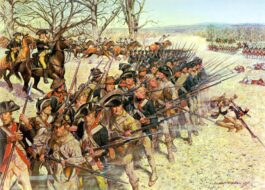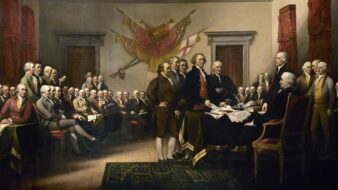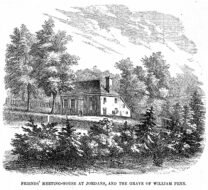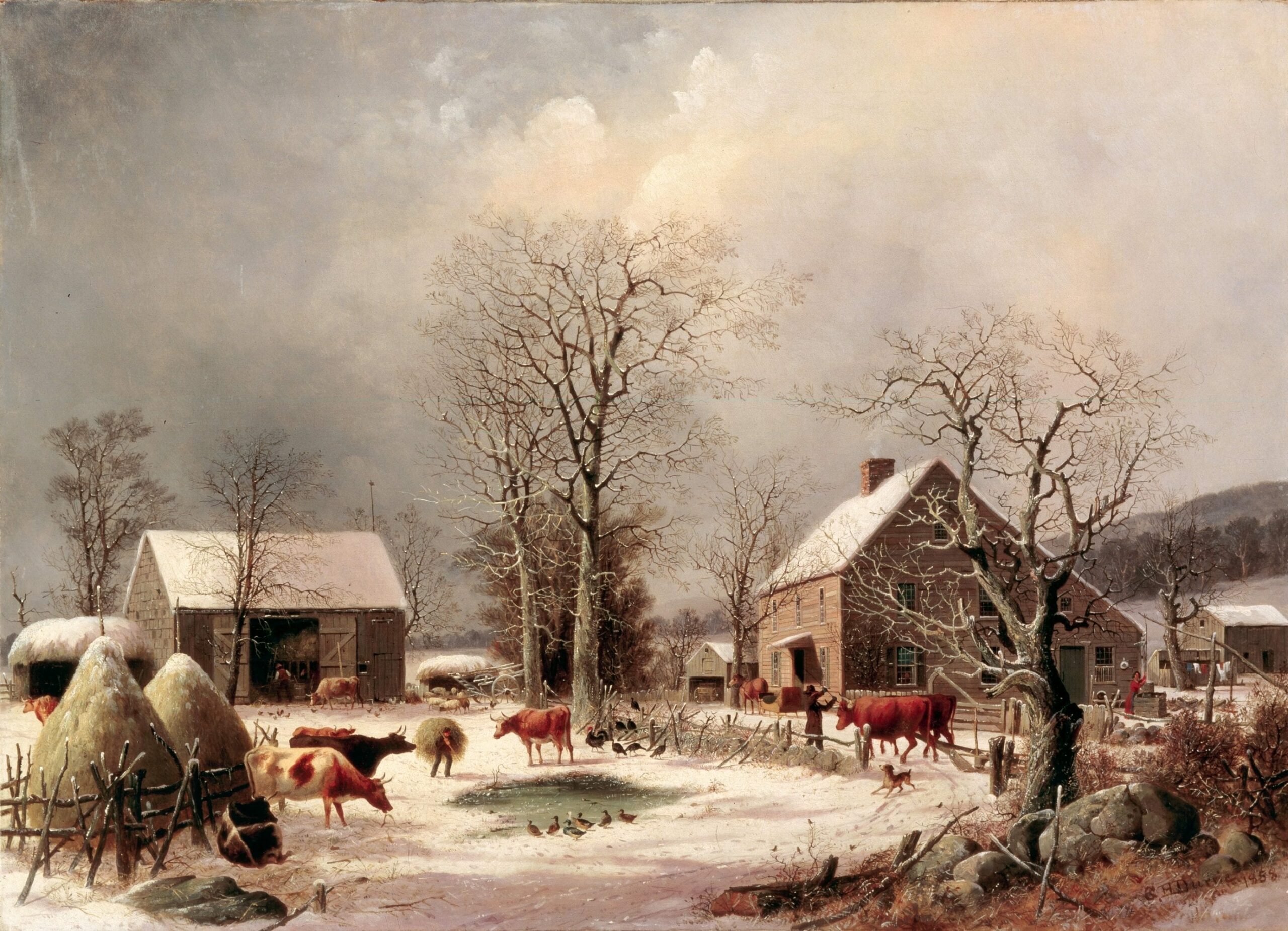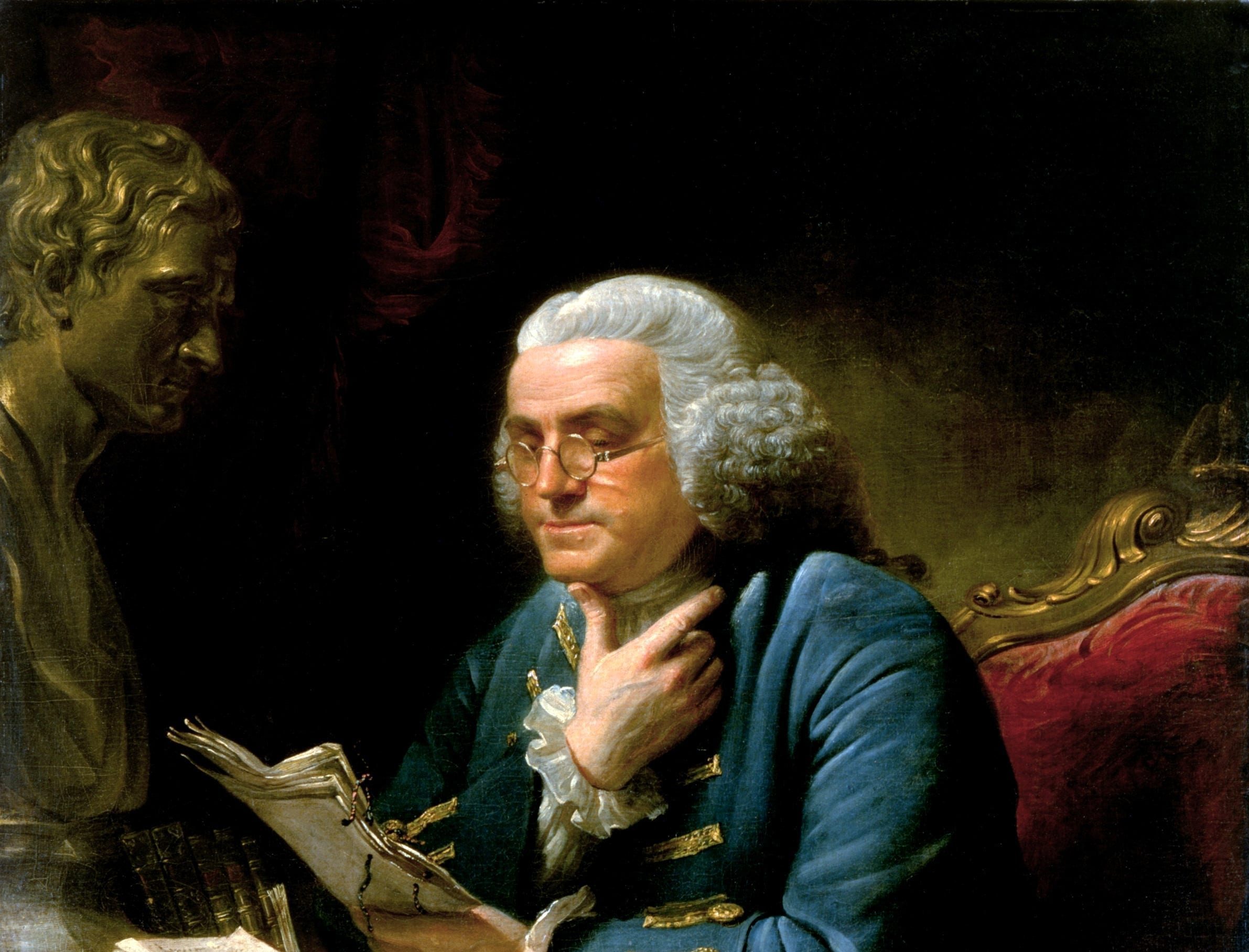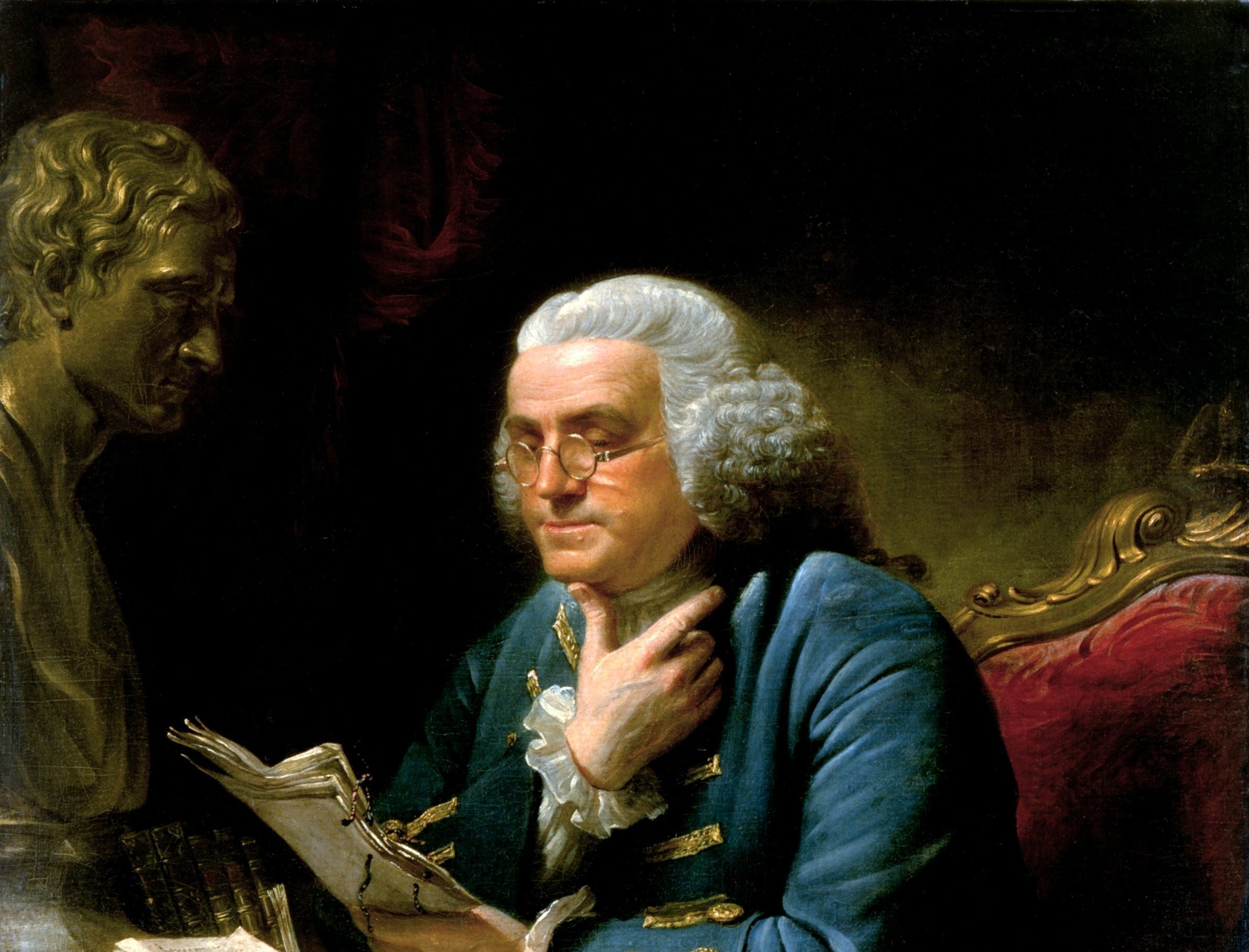
Introduction
After the Constitution was presented to the states for ratification in September 1787, a widespread period of public debate over the merits of the plan began. Newspapers ran editorial essays by both proponents of the new system (who became known as Federalists) and those who opposed it for various reasons (who became known as Anti-Federalists). Among the many points of contention, the most fundamental issue was whether or not the more energetic national government proposed by the Constitution would (either immediately or eventually) subsume the state governments. And related to that: could the people of the United States maintain their freedom under such a powerful national government, without the intervening layers of accountability and representation? These concerns dominated the exchange between the two factions, and, as Robert Yates pointed out in Brutus I (Document A), they were fundamental to the discussion of any other features of the plan.
The ratification debates opened up an ongoing reflection on the regional differences between the various member states of the Union that would not be resolved until well after the Civil War. Federalist 10 (Document B) considers this important political question of the relationship between liberty and faction, observing that insofar as men are free, they are liable to adopt different opinions and interests that put them into conflict with one another.
Even the proponents of the Constitution did not find the system flawless: among others, Thomas Jefferson and James Madison (Document C) shared Anti-Federalists’ concerns about the lack of a Bill of Rights in the draft presented to the states for ratification. Explicit protections for individual rights against the power of the new federal government would, they argued, work to mitigate any tendencies towards consolidation and tyranny the new system of government might have.
Documents in this chapter are available separately by following the hyperlinks below:
- (Robert Yates), Brutus 1, October 18, 1787
- Publius (James Madison), Federalist 10, November 22, 1787
- Thomas Jefferson and James Madison, “If we cannot secure all our rights, let us secure what we can,” October 1788–March 1789
(Robert Yates), Brutus I, October 18, 17871
. . . We have felt the feebleness of the ties by which these United-States are held together, and the want of sufficient energy in our present confederation, to manage, in some instances, our general concerns. Various expedients have been proposed to remedy these evils, but none have succeeded. At length a Convention of the states has been assembled; they have formed a constitution which will now, probably, be submitted to the people to ratify or reject, who are the fountain of all power, to whom alone it of right belongs to make or unmake constitutions, or forms of government, at their pleasure. The most important question that was ever proposed to your decision, or to the decision of any people under heaven, is before you, and you are to decide upon it by men of your own election, chosen specially for this purpose. If the constitution, offered to [your acceptance], be a wise one, calculated to preserve the invaluable blessings of liberty, to secure the inestimable rights of mankind, and promote human happiness, then, if you accept it, you will lay a lasting foundation of happiness for millions yet unborn; generations to come will rise up and call you blessed. You may rejoice in the prospects of this vast extended continent becoming filled with freemen, who will assert the dignity of human nature. You may solace yourselves with the idea, that society, in this favored land, will fast advance to the highest point of perfection; the human mind will expand in knowledge and virtue, and the golden age be, in some measure, realized. But if, on the other hand, this form of government contains principles that will lead to the subversion of liberty—if it tends to establish a despotism, or, what is worse, a tyrannic aristocracy; then, if you adopt it, this only remaining asylum for liberty will be [shut] up, and posterity will execrate your memory. . . .
With these few introductory remarks I shall proceed to a consideration of this constitution:
The first question that presents itself on the subject is, whether a confederated government be the best for the United States or not? Or in other words, whether the thirteen United States should be reduced to one great republic, governed by one legislature, and under the direction of one executive and judicial; or whether they should continue thirteen confederated republics, under the direction and control of a supreme federal head for certain defined national purposes only?
This enquiry is important, because, although the government reported by the convention does not go to a perfect and entire consolidation, yet it approaches so near to it, that it must, if executed, certainly and infallibly terminate in it.
This government is to possess absolute and uncontrollable power, legislative, executive and judicial, with respect to every object to which it extends, for by the last clause of section 8th, article Ist, it is declared “that the Congress shall have power to make all laws which shall be necessary and proper for carrying into execution the foregoing powers, and all other powers vested by this constitution, in the government of the United States; or in any department or office thereof.” And by the 6th article, it is declared “that this constitution, and the laws of the United States, which shall be made in pursuance thereof, and the treaties made, or which shall be made, under the authority of the United States, shall be the supreme law of the land; and the judges in every state shall be bound thereby, any thing in the constitution, or law of any state to the contrary notwithstanding.” It appears from these articles that there is no need of any intervention of the state governments, between the Congress and the people, to execute any one power vested in the general government, and that the constitution and laws of every state are nullified and declared void, so far as they are or shall be inconsistent with this constitution, or the laws made in pursuance of it, or with treaties made under the authority of the United States. The government then, so far as it extends, is a complete one, and not a confederation. It is as much one complete government as that of New-York or Massachusetts, has as absolute and perfect powers to make and execute all laws, to appoint officers, institute courts, declare offences, and annex penalties, with respect to every object to which it extends, as any other in the world. So far therefore as its powers reach, all ideas of confederation are given up and lost.
. . . It has authority to make laws which will affect the lives, the liberty, and property of every man in the United States; nor can the constitution or laws of any state, in any way prevent or impede the full and complete execution of every power given. The legislative power is competent to lay taxes, duties, imposts, and excises; there is no limitation to this power, unless it be said that the clause which directs the use to which those taxes, and duties shall be applied, may be said to be a limitation; but this is no restriction of the power at all, for by this clause they are to be applied to pay the debts and provide for the common defense and general welfare of the United States; but the legislature have authority to contract debts at their discretion; they are the sole judges of what is necessary to provide for the common defense, and they only are to determine what is for the general welfare: this power therefore is neither more nor less, than a power to lay and collect taxes, imposts, and excises, at their pleasure. . . . In the business therefore of laying and collecting taxes, the idea of confederation is totally lost, and that of one entire republic is embraced. It is proper here to remark, that the authority to lay and collect taxes is the most important of any power that can be granted; it connects with it almost all other powers, or at least will in process of time draw all other after it; it is the great mean of protection, security, and defense, in a good government, and the great engine of oppression and tyranny in a bad one. . . .
The judicial power of the United States is to be vested in a supreme court, and in such inferior courts as Congress may from time to time ordain and establish. The powers of these courts are very extensive; their jurisdiction comprehends all civil causes, except such as arise between citizens of the same state; and it extends to all cases in law and equity arising under the constitution. One inferior court must be established, I presume, in each state at least, with the necessary executive officers appendant thereto. It is easy to see, that in the common course of things, these courts will eclipse the dignity, and take away from the respectability, of the state courts. These courts will be, in themselves, totally independent of the states, deriving their authority from the United States, and receiving from them fixed salaries; and in the course of human events it is to be expected, that they will swallow up all the powers of the courts in the respective states.
How far the clause in the 8th section of the Ist article may operate to do away all idea of confederated states, and to effect an entire consolidation of the whole into one general government, it is impossible to say. The powers given by this article are very general and comprehensive, and it may receive a construction to justify the passing almost any law. A power to make all laws, which shall be necessary and proper, for carrying into execution, all powers vested by the constitution in the government of the United States, or any department or officer thereof, is a power very comprehensive and definite, and may, for ought I know, be exercised in a such manner as entirely to abolish the state legislatures.
. . . [T]he legislature of the United States are vested with the great and uncontrollable powers, of laying and collecting taxes, duties, imposts, and excises; of regulating trade, raising and supporting armies, organizing, arming, and disciplining the militia, instituting courts, and other general powers. And are by this clause invested with the power of making all laws, proper and necessary, for carrying all these into execution; and they may so exercise this power as entirely to annihilate all the state governments, and reduce this country to one single government. And if they may do it, it is pretty certain they will; for it will be found that the power retained by individual states, small as it is, will be a clog upon the wheels of the government of the United States; the latter therefore will be naturally inclined to remove it out of the way. Besides, it is a truth confirmed by the unerring experience of ages, that every man, and every body of men, invested with power, are ever disposed to increase it, and to acquire a superiority over everything that stands in their way. . . .
Let us now proceed to enquire, as I at first proposed, whether it be best the thirteen United States should be reduced to one great republic, or not? It is here taken for granted, that all agree in this, that whatever government we adopt, it ought to be a free one; that it should be so framed as to secure the liberty of the citizens of America, and such a one as to admit of a full, fair, and equal representation of the people. The question then will be, whether a government thus constituted, and founded on such principles, is practicable, and can be exercised over the whole United States, reduced into one state? . . .
In every government, the will of the sovereign is the law. In despotic governments, the supreme authority being lodged in one, his will is law, and can be as easily expressed to a large extensive territory as to a small one. In a pure democracy the people are the sovereign, and their will is declared by themselves; for this purpose, they must all come together to deliberate, and decide. This kind of government cannot be exercised, therefore, over a country of any considerable extent; it must be confined to a single city, or at least limited to such bounds as that the people can conveniently assemble, be able to debate, understand the subject submitted to them, and declare their opinion concerning it.
In a free republic, although all laws are derived from the consent of the people, yet the people do not declare their consent by themselves in person, but by representatives, chosen by them, who are supposed to know the minds of their constituents, and to be possessed of integrity to declare this mind.
. . . If the people are to give their assent to the laws, by persons chosen and appointed by them, the manner of the choice and the number chosen, must be such, as to possess, be disposed, and consequently qualified to declare the sentiments of the people; for if they do not know, or are not disposed to speak the sentiments of the people, the people do not govern, but the sovereignty is in a few. Now, in a large extended country, it is impossible to have a representation, possessing the sentiments, and of integrity, to declare the minds of the people, without having it so numerous and unwieldly, as to be subject in great measure to the inconveniency of a democratic government.
The territory of the United States is of vast extent; it now contains near three millions of souls, and is capable of containing much more than ten times that number. Is it practicable for a country, so large and so numerous as they will soon become, to elect a representation, that will speak their sentiments, without their becoming so numerous as to be incapable of transacting public business? It certainly is not.
In a republic, the manners, sentiments, and interests of the people should be similar. If this be not the case, there will be a constant clashing of opinions; and the representatives of one part will be continually striving against those of the other. This will retard the operations of government, and prevent such conclusions as will promote the public good. If we apply this remark to the condition of the United States, we shall be convinced that it forbids that we should be one government. The United States includes a variety of climates. The productions of the different parts of the union are very variant, and their interests, of consequence, diverse. Their manners and habits differ as much as their climates and productions; and their sentiments are by no means coincident. The laws and customs of the several states are, in many respects, very diverse, and in some opposite; each would be in favor of its own interests and customs, and, of consequence, a legislature, formed of representatives from the respective parts, would not only be too numerous to act with any care or decision, but would be composed of such heterogenous and discordant principles, as would constantly be contending with each other. . . .
. . . The confidence which the people have in their rulers, in a free republic, arises from their knowing them, from their being responsible to them for their conduct, and from the power they have of displacing them when they misbehave: but in a republic of the extent of this continent, the people in general would be acquainted with very few of their rulers: the people at large would know little of their proceedings, and it would be extremely difficult to change them. . . . The different parts of so extensive a country could not possibly be made acquainted with the conduct of their representatives, nor be informed of the reasons upon which measures were founded. The consequence will be, they will have no confidence in their legislature, suspect them of ambitious views, be jealous of every measure they adopt, and will not support the laws they pass. Hence the government will be nerveless and inefficient, and no way will be left to render it otherwise, but by establishing an armed force to execute the laws at the point of the bayonet—a government of all others the most to be dreaded.
In a republic of such vast extent as the United-States, the legislature cannot attend to the various concerns and wants of its different parts. It cannot be sufficiently numerous to be acquainted with the local condition and wants of the different districts, and if it could, it is impossible it should have sufficient time to attend to and provide for all the variety of cases of this nature, that would be continually arising. . . .
These are some of the reasons by which it appears, that a free republic cannot long subsist over a country of the great extent of these states. If then this new constitution is calculated to consolidate the thirteen states into one, as it evidently is, it ought not to be adopted. . . .
Back to TopPublius (James Madison), Federalist 10, November 22, 17872
Among the numerous advantages promised by a well-constructed union, none deserves to be more accurately developed, than its tendency to break and control the violence of faction. The friend of popular governments, never finds himself so much alarmed for their character and fate, as when he contemplates their propensity to this dangerous vice. He will not fail, therefore, to set a due value on any plan which, without violating the principles to which he is attached, provides a proper cure for it. . . . Complaints are everywhere heard from our most considerate and virtuous citizens, equally the friends of public and private faith, and of public and personal liberty, that our governments are too unstable; that the public good is disregarded in the conflicts of rival parties; and that measures are too often decided, not according to the rules of justice, and the rights of the minor party, but by the superior force of an interested and overbearing majority. However anxiously we may wish that these complaints had no foundation, the evidence of known facts will not permit us to deny that they are in some degree true. . . .
By a faction, I understand a number of citizens, whether amounting to a majority or minority of the whole, who are united and actuated by some common impulse of passion, or of interest, adverse to the rights of other citizens, or to the permanent and aggregate interests of the community.
There are two methods of curing the mischiefs of faction: The one, by removing its causes; the other, by controlling its effects.
There are again two methods of removing the causes of faction: The one, by destroying the liberty which is essential to its existence; the other, by giving to every citizen the same opinions, the same passions, and the same interests.
It could never be more truly said, than of the first remedy, that it is worse than the disease. Liberty is to faction, what air is to fire, an element, without which it instantly expires. But it could not be a less folly to abolish liberty, which is essential to political life, because it nourishes faction, than it would be to wish the annihilation of air, which is essential to animal life, because it imparts to fire its destructive agency.
The second expedient is as impracticable, as the first would be unwise. As long as the reason of man continues fallible, and he is at liberty to exercise it, different opinions will be formed. As long as the connection subsists between his reason and his self-love, his opinions and his passions will have a reciprocal influence on each other; and the former will be objects to which the latter will attach themselves. The diversity in the faculties of men, from which the rights of property originate, is not less an insuperable obstacle to an uniformity of interests. The protection of these faculties, is the first object of government. From the protection of different and unequal faculties of acquiring property, the possession of different degrees and kinds of property immediately results; and from the influence of these on the sentiments and views of the respective proprietors, ensues a division of the society into different interests and parties.
The latent causes of faction are thus sown in the nature of man; and we see them everywhere brought into different degrees of activity, according to the different circumstances of civil society. A zeal for different opinions concerning religion, concerning government, and many other points, as well of speculation as of practice . . . have, in turn, divided mankind into parties, inflamed them with mutual animosity, and rendered them much more disposed to vex and oppress each other, than to co-operate for their common good. So strong is this propensity of mankind, to fall into mutual animosities, that where no substantial occasion presents itself, the most frivolous and fanciful distinctions have been sufficient to kindle their unfriendly passions, and excite their most violent conflicts. But the most common and durable source of factions, has been the various and unequal distribution of property. Those who hold, and those who are without property, have ever formed distinct interests in society. . . . The regulation of these various and interfering interests, forms the principal task of modern legislation, and involves the spirit of party and faction in the necessary and ordinary operations of government. . . .
It is in vain to say, that enlightened statesmen will be able to adjust these clashing interests, and render them all subservient to the public good. Enlightened statesmen will not always be at the helm: nor, in many cases, can such an adjustment be made at all, without taking into view indirect and remote considerations, which will rarely prevail over the immediate interest which one party may find in disregarding the rights of another, or the good of the whole.
The inference to which we are brought, is, that the causes of faction cannot be removed; and that relief is only to be sought in the means of controlling its effects.
If a faction consists of less than a majority, relief is supplied by the republican principle, which enables the majority to defeat its sinister views, by regular vote. It may clog the administration, it may convulse the society; but it will be unable to execute and mask its violence under the forms of the constitution. When a majority is included in a faction, the form of popular government, on the other hand, enables it to sacrifice to its ruling passion or interest, both the public good and the rights of other citizens. To secure the public good, and private rights, against the danger of such a faction, and at the same time to preserve the spirit and the form of popular government, is then the great object to which our inquiries are directed. . . .
By what means is this object attainable? Evidently by one of two only. Either the existence of the same passion or interest in a majority, at the same time, must be prevented; or the majority, having such co-existent passion or interest, must be rendered, by their number and local situation, unable to concert and carry into effect schemes of oppression. If the impulse and the opportunity be suffered to coincide, we well know, that neither moral nor religious motives can be relied on as an adequate control. They are not found to be such on the injustice and violence of individuals, and lose their efficacy in proportion to the number combined together; that is, in proportion as their efficacy becomes needful. . . .
A republic, by which I mean a government in which the scheme of representation takes place . . . promises the cure for which we are seeking. Let us examine the points in which it varies from pure democracy, and we shall comprehend both the nature of the cure and the efficacy which it must derive from the union.
The two great points of difference, between a democracy and a republic, are, first, the delegation of the government, in the latter, to a small number of citizens elected by the rest; secondly, the greater number of citizens, and greater sphere of country, over which the latter may be extended.
The effect of the first difference is, on the one hand, to refine and enlarge the public views, by passing them through the medium of a chosen body of citizens, whose wisdom may best discern the true interest of their country, and whose patriotism and love of justice, will be least likely to sacrifice it to temporary or partial considerations. Under such a regulation, it may well happen, that the public voice, pronounced by the representatives of the people, will be more consonant to the public good, than if pronounced by the people themselves, convened for the purpose. On the other hand, the effect may be inverted. Men of factious tempers, of local prejudices, or of sinister designs, may by intrigue, by corruption, or by other means, first obtain the suffrages, and then betray the interests of the people. The question resulting is, whether small or extensive republics are most favorable to the election of proper guardians of the public weal; and it is clearly decided in favor of the latter by two obvious considerations.
In the first place, it is to be remarked, that however small the republic may be, the representatives must be raised to a certain number, in order to guard against the cabals of a few; and that, however large it may be, they must be limited to a certain number, in order to guard against the confusion of a multitude. Hence, the number of representatives in the two cases not being in proportion to that of the constituents, and being proportionally greatest in the small republic, it follows, that if the proportion of fit characters be not less in the large than in the small republic, the former will present a greater option, and consequently a greater probability of a fit choice.
In the next place, as each representative will be chosen by a greater number of citizens in the large than in the small republic, it will be more difficult for unworthy candidates to practice with success the vicious arts, by which elections are too often carried; and the suffrages of the people being more free, will be more likely to center in men who possess the most attractive merit, and the most diffusive and established characters.
It must be confessed, that in this, as in most other cases, there is a mean, on both sides of which inconveniences will be found to lie. By enlarging too much the number of electors, you render the representative too little acquainted with all their local circumstances and lesser interests; as by reducing it too much, you render him unduly attached to these, and too little fit to comprehend and pursue great and national objects. The federal constitution forms a happy combination in this respect; the great and aggregate interests, being referred to the national, the local and particular to the state legislatures.
The other point of difference is, the greater number of citizens, and extent of territory, which may be brought within the compass of republican, than of democratic government; and it is this circumstance principally which renders factious combinations less to be dreaded in the former, than in the latter. The smaller the society, the fewer probably will be the distinct parties and interests composing it; the fewer the distinct parties and interests, the more frequently will a majority be found of the same party; and the smaller the number of individuals composing a majority, and the smaller the compass within which they are placed, the more easily will they concert and execute their plans of oppression. Extend the sphere, and you take in a greater variety of parties and interests; you make it less probable that a majority of the whole will have a common motive to invade the rights of other citizens; or if such a common motive exists, it will be more difficult for all who feel it to discover their own strength, and to act in unison with each other. Besides other impediments, it may be remarked, that where there is a consciousness of unjust or dishonorable purposes, communication is always checked by distrust, in proportion to the number whose concurrence is necessary.
Hence it clearly appears, that the same advantage, which a republic has over a democracy, in controlling the effects of faction, is enjoyed by a large over a small republic,—is enjoyed by the union over the states composing it. . . .
In the extent and proper structure of the union, therefore, we behold a republican remedy for the diseases most incident to republican government. And according to the degree of pleasure and pride we feel in being republicans, ought to be our zeal in cherishing the spirit, and supporting the character of federalists.
Back to TopThomas Jefferson and James Madison, “If we cannot secure all our rights, let us secure what we can,” October 1788–March 17893
Madison to Jefferson | New York, October 17, 1788
. . . The little pamphlet4 herewith enclosed will give you a collective view of the alterations which have been proposed for the new Constitution. Various and numerous as they appear they certainly omit many of the true grounds of opposition. The articles relating to Treatises, to paper money, and to contracts, created more enemies than all errors in the System positive and negative put together. It is true nevertheless that not a few, particularly in Virginia have contended for the proposed alterations from the most honorable and patriotic motives; and that among the advocates for the Constitution there are some who wish for further guards to public liberty and individual rights. As far as these may consist of a constitutional declaration of the most essential rights, it is probable they will be added; though there are many who think such addition unnecessary, and not a few who think it misplaced in such a Constitution. There is scarce any point on which the party in opposition is so much divided as to its importance and its propriety.
My own opinion has always been in favor of a bill of rights; provided it be so framed as not to imply powers not meant to be included in the enumeration.5 At the same time I have never thought the omission a material defect nor been anxious to supply it even by subsequent amendment, for any other reason than that it is anxiously desired by others. I have favored it because I supposed it might be of use, and if properly executed could not be of disservice.
I have not viewed it in an important light. 1. Because I conceive that in a certain degree, though not in the extent argued by Mr. Wilson, the rights in question are reserved by the manner in which the federal powers are granted. 2. Because there is great reason to fear that a positive declaration of some of the most essential rights could not be obtained in the requisite latitude. I am sure that the rights of conscience in particular, if submitted to the public definition[,] would be narrowed much more than they are likely ever to be by an assumed power. One of the objections in New England was that the Constitution by prohibiting religious tests opened a door for Jews, Turks and infidels. 3. Because the limited powers of the federal Government and the jealousy of the subordinate Governments, afford a security which has not existed in the case of the State Governments, and exists in no other. 4. Because experience proves the inefficacy of a bill of rights on those occasions when its control is most needed. Repeated violations of these parchment barriers have been committed by overbearing majorities in every State. In Virginia I have seen the bill of rights violated in every instance where it has been opposed to a popular current. Notwithstanding the explicit provision contained in that instrument for the rights of Conscience it is well known that a religious establishment would have taken place and on narrower ground than was then proposed, notwithstanding the additional obstacle which the law has since created. Wherever the real power in a Government lies, there is the danger of oppression.
In our Governments the real power lies in the majority of the Community, and the invasion of private rights is chiefly to be apprehended, not from acts of Government contrary to the sense of its constituents, but from acts in which the Government is the mere instrument of the majority of the constituents. This is a truth of great importance, but not yet sufficiently attended to: and is probably more strongly impressed on my mind by facts, and reflections suggested by them, than on yours which has contemplated abuses of power issuing from a very different quarter. Wherever there is an interest and power to do wrong, wrong will generally be done, and not less readily by a powerful and interested party than by a powerful and interested prince. The difference, so far as it relates to the superiority of republics over monarchies, lies in the less degree of probability that interest may prompt abuses of power in the former than in the latter; and in the security in the former against oppression of more than the smaller part of the Society, whereas in the former [Madison seems to have erred, writing “former” when he meant “latter”—ie., in monarchies] it may be extended in a manner to the whole. The difference so far as it relates to the point in question—the efficacy of a bill of rights in controlling abuses of power—lies in this: that in a monarchy the latent force of the nation is superior to that of the Sovereign, and a solemn charter of popular rights must have a great effect, as a standard for trying the validity of public acts, and a signal for rousing and uniting the superior force of the community; whereas in a popular Government, the political and physical power may be considered as vested in the same hands, that is in a majority of the people, and consequently the tyrannical will of the sovereign is not to be controlled by the dread of an appeal to any other force within the community.
What use then it may be asked can a bill of rights serve in popular Governments? I answer the two following, which, though less essential than in other Governments, sufficiently recommend the precaution. 1. The political truths declared in that solemn manner acquire by degrees the character of fundamental maxims of free Government, and as they become incorporated with the national sentiment, counteract the impulses of interest and passion. 2. Although it be generally true as above stated that the danger of oppression lies in the interested majorities of the people rather than in usurped acts of the Government, yet there may be occasions on which the evil may spring from the latter sources; and on such, a bill of rights will be a good ground for an appeal to the sense of the community. Perhaps too there may be a certain degree of danger, that a succession of artful and ambitious rulers, may by gradual and well-timed advances, finally erect an independent Government on the subversion of liberty. Should this danger exist at all, it is prudent to guard against it, especially when the precaution can do no injury. At the same time I must own that I see no tendency in our governments to danger on that side. It has been remarked that there is a tendency in all Governments to an augmentation of power at the expense of liberty. But the remark as usually understood does not appear to me well founded. Power when it has attained a certain degree of energy and independence goes on generally to further degrees. But when below that degree, the direct tendency is to further degrees of relaxation, until the abuses of liberty beget a sudden transition to an undue degree of power. With this explanation the remark may be true; and in the latter sense only is it in my opinion applicable to the Governments in America. It is a melancholy reflection that liberty should be equally exposed to danger whether the Government have too much or too little power; and that the line which divides these extremes should be so inaccurately defined by experience.
Supposing a bill of rights to be proper, the articles which ought to compose it admit of much discussion. I am inclined to think that absolute restrictions in cases that are doubtful, or where emergencies may overrule them, ought to be avoided. The restrictions however strongly marked on paper will never be regarded when opposed to the decided sense of the public; and after repeated violations in extraordinary cases, they will lose even their ordinary efficacy. Should a Rebellion or insurrection alarm the people as well as the Government, and a suspension of the Hab. Corp.6 be dictated by the alarm, no written prohibitions on earth would prevent the measure. Should an army in time of peace be gradually established in our neighborhood by Britain or Spain, declarations on paper would have as little effect in preventing a standing force for the public safety. The best security against these evils is to remove the pretext for them.
With regard to Monopolies, they are justly classed among the greatest nuisances in Government. But is it clear that as encouragements to literary works and indigenous discoveries, they are not too valuable to be wholly renounced? Would it not suffice to reserve in all cases a right to the public to abolish the privilege at a price to be specified in the grant of it? Is there not also infinitely less danger of this abuse in our Governments than in most others? Monopolies are sacrifices of the many to the few. Where the power is in the few it is natural for them to sacrifice the many to their own partialities and corruptions. Where the power, as with us, is in the many not in the few, the danger cannot be very great that the few will be thus favored. It is much more to be dreaded that the few will be unnecessarily sacrificed to the many. . . .
Jefferson to Madison | Paris, March 15, 1789
. . . The declaration of rights is, like all other human blessings, alloyed with some inconveniences, and not accomplishing fully its object. But the good of this instance vastly overweighs the evil. I cannot refrain from making short answers to the objections which your letter states to have been raised.
- That the rights in question are reserved by the manner in which the federal powers are granted. Answer: A constitutive act may, certainly, be so formed, as to need no declaration of rights. The act itself has the force of a declaration, as far as it goes; and if it goes to all material points, nothing more is wanting. In the draught7 of a constitution which I had once a thought of proposing in Virginia, and printed afterwards, I endeavored to reach all the great objects of public liberty, and did not mean to add a declaration of rights. Probably the object was imperfectly executed; but the deficiencies would have been supplied by others, in the course of discussion. But in a constitutive act which leaves some precious articles unnoticed, and raises implications against others, a declaration of rights becomes necessary, by way of supplement. This is the case of our new federal Constitution. This instrument forms us into one State, as to certain objects, and gives us a legislative and executive body for these objects. It should, therefore, guard us against their abuses of power, within the field submitted to them.
- A positive declaration of some essential rights could not be obtained in the requisite latitude. Answer: Half a loaf is better than no bread. If we cannot secure all our rights, let us secure what we can.
- The limited powers of the federal government, and jealousy of the subordinate governments, afford a security which exists in no other instance. Answer: The first member of this seems resolvable into the first objection before stated. The jealousy of the subordinate governments is a precious reliance. But observe that those governments are only agents. They must have principles furnished them, whereon to found their opposition. The declaration of rights will be the text, whereby they will try all the acts of the federal government. In this view, it is necessary to the federal government also; as by the same text they may try the opposition of the subordinate governments.
- Experience proves the inefficacy of a bill of rights. True. But though it is not absolutely efficacious under all circumstances, it is of great potency always, and rarely inefficacious. A brace the more will often keep up the building which would have fallen with that brace the less. There is a remarkable difference between the characters of the inconveniencies which attend a declaration of rights, and those which attend the want of it. The inconveniences of the declaration are, that it may cramp government in its useful exertions. But the evil of this is short-lived, moderate and reparable. The inconveniencies of the want of a declaration are permanent, afflicting and irreparable. They are in constant progression from bad to worse. The executive, in our governments, is not the sole, it is scarcely the principal object of my jealousy. The tyranny of the legislatures is the most formidable dread at present, and will be for many years. That of the executive will come in its turn; but it will be at a remote period. . . .
- 1. In The American Republic: Primary Sources, ed. Bruce Frohnen (Indianapolis: Liberty Fund, 2002). Robert Yates (1738 – 1801) was a leading jurist and anti-Federalist in New York.
- 2. George W. Carey and James McClellan, eds., The Federalist: The Gideon Edition, (Indianapolis: Liberty Fund, 2001), 42-49.
- 3. Founders Online, National Archives.
- 4. Edmund Randolph, The Ratifications of the New Federal Constitution, Together with the Amendments, Proposed by the Several States (Richmond, VA: Published by Augustine Davis, 1788).
- 5. By "the enumeration," Madison means the powers explicitly given to the federal government by the Constitution.
- 6. habeas corpus
- 7. draft

Conversation-based seminars for collegial PD, one-day and multi-day seminars, graduate credit seminars (MA degree), online and in-person.



























